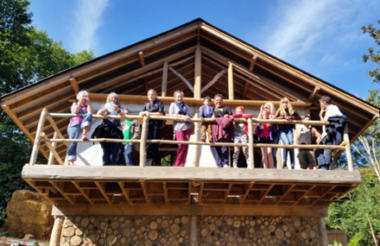The grant funding process does not meet the needs of small charities and is in need of an overhaul, says Warren Carter of Moulsecoomb Forest Garden.
Writing grant applications is the most soul-destroying and pointless waste of resources a charity can undertake.
The problem is, how can you function without applying for grants? Of course if you hit the jackpot it's worth all the effort, but with odds getting longer and longer and trusts being swamped by applications, it seems it would be better to spend all your reserves on buying lottery tickets!
If you multiply all the small charities across the country chasing the same small pots of money, I hate to think of all the hours, resources and cash that is wasted on grant applications.
There's got to be a better way than this.
As someone who runs a charity and is on the board of a trust that gives out small grants I like to think I have an insight into both sides of the coins. In fact it wouldn't do grant givers any harm for their staff to do some work experience at a small charity to understand the problems and some of the over the top demands they and councils make.
When I spoke to one organisation, asking if it is worth us applying for their pot of gold, I said that we fitted all the criteria perfectly, but as a small charity without many administration resources, we needed an idea of our chances. “Come to our one day seminar,” I was told.
Click here
But that's the point: I haven't got time to come to a bloody one day seminar in London!
So here's a few steps grant givers can do to make things more bearable (and they're not exactly rocket science).
1. Make forms as simple as possible
Forms seem to get more demanding. Is this necessary? How many hoops do you really need to make people jump through? How do you know that you aren't just giving the money to those who can write the best bids or know the right people?
2. Make the guidelines as clear as possible
Speak English! It took me ages to figure out what an 'outcome' was.
3. Have a two phase application process
Why not ask for just a few paragraphs to see if the charity has a cat in hell’s chance of getting any money in the first place, before they waste lots of hours.
4. Stop funding only new projects
Surely it shows success (or should I say 'sustainability') if a charity has been going for a number of years. Fund core costs and boring but essential stuff like insurance, rent and wages.
5. Give feedback if an application is turned down
This is probably most important. It's not acceptable to ask organisations to write pages and pages, budget forecasts and how much they spend on loo paper and then tell people that you don't have the capacity to say why you didn't give them any money.
I don't want our charity to rely on grants and we have doing our best to increase our income to nearly 50 per cent of our turnover. We try to get support from sympathetic business and supporters ('diversify'). However, the nature of the work means we will probably always have to rely on some grant funding which is probably more fool us.
But how much more 'effective' would we be if all this precious time was spent doing what we were set out to do in the first place. There's nothing about sitting in front of a computer screen in our 'aims and objectives'.
So when I sit down to another application, making sure we fit all the guidelines, I can’t help thinking of that Einstein quote that insanity is doing the same thing over and over again and expecting different results.
It's time for a major rethink.
Warren Carter is project manager at Moulsecoomb Forest Garden and Wildlife Project. This article is adapted from one originally written on Moulsecoomb’s own blog site.









